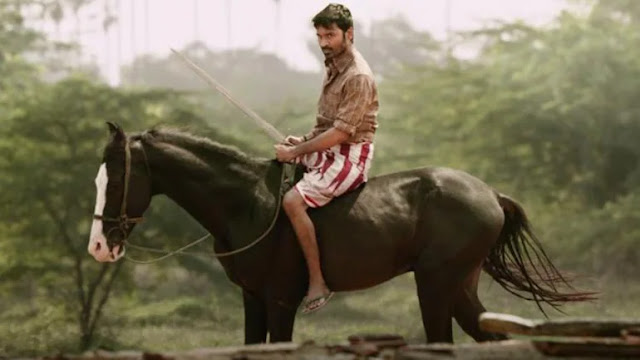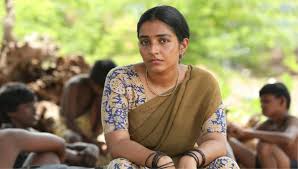Karnan Movie Review: Mari Selvaraj's Karnan opens with the shot of a young girl suffering from fits lying helpless in the middle of the road. Vehicles continue to ply on both sides of the road, but not a single one stops. Theni Eswar's camera rises above the ground and goes up higher and higher, giving us a God's eye view of this tragic scene. There is no divine intervention; in fact, the girl dies, and becomes a Goddess — Kaattu Pechi!
Karnan opens with a scene of a girl who is not more than 10, suffering a fatal seizure in the middle of a road. Nobody comes to her rescue and she stops moving after a while. As she lies there quietly, you can see an oncoming bus, whose driver seems to be unaware of the girl lying on the road, or so you think. And you know in a bit she will directly come under the wheels of the bus. You watch the scene with horror as it finally happens. The bus runs over her, and then another. It happens over and over again as no one stops to help the little girl. The girl on the main road is a metaphor. Like a street dog, she is left alone on the road as if her young life has no value. The heavy emotions that the opening scene evokes in you will only grow stronger as you come to see how a community of people are dehumanised.
The film then cuts to Santhosh Narayanan's now iconic Kanda Vara Sollunga song. We see an entire village praying for the return of Karnan (Dhanush). And Mari Selvaraj establishes the mythical status of his protagonist right away. We do not actually see his face; rather, we see his feet (splayed with blood, and trampled by the boots of cops), his hands (handcuffed), and his head (covered by a black cloth). We see who Karnan is through the tattoos that the people sport, and the painting that a painter does with fire.
The film then goes back by a few years, to 1997, to narrate how Karnan became his people's hero, how oppression can be insidious, and how the bureaucracy stands by the side of the oppressor and even takes part in the oppression. The plot revolves around Podiyankulam, a poor village of people belonging to the oppressed communities which is refused a bus stop. Their powerful men (obviously of the dominant caste) of their neighbouring village, Melur, use this as a means to keep them dependant on them. Matters come to a head when Karnan, an angry, young man from Podiyankulam, who is waiting to be selected in the army, decides to take things in his own hands. A bus is trashed, prompting the cops, led by the egoistic officer Kannapiran (Natty), to retaliate.
On the surface, Karnan might seem like a familiar tale of struggle between the oppressed and oppressor, but Mari Selvaraj's detailing makes the film feel both unique and universal at the same time. It is quite similar to the conflict within his Karnan, who fights for the public good and also for personal reasons.
In the first half, the director takes his time to set up the milieu and the characters, which include Karnan's side-kick of sorts Yeman Thatha (Lal, in another empathetic performance after last week's Sulthan), his unmarried elder sister Padmini (Lakshmi Priyaa Chandramouli, effective), who is the family's breadwinner, his love interest Draupathi (Rajisha Vijayan, solid in her Tamil debut), her friend who is about to enter college (Gouri Kishan), her brother (Yogi Babu, who gets to play a character rather than a comedian), his docile father (Poo Ram) and the village elder Dhuryodhanan (GM Kumar) among others. In Mari Selvaraj's world, even the animals, birds and insects, from the eagles the steal chicks to dogs that scamper in the background, the cat that goes after thrown-away food, that the elephant that is brought in for a celebration, the pigs in the sty, and even the bugs that are mating in rain are integral to the milieu, and he repeatedly gives us these throwaway shots to lend a real-world feel to the world he is building.
In the first half, he gradually builds up a pressure-cooker situation that sets off a chain reaction. Like in Maheshinte Prathikaram, where one thing led to another leading to the central conflict, here an offhand remark during a game leads to a tussle, which leads to a falling out, which leads to a domestic friction, which leads to a public spat, which ends up in an act of violence. But Mari Selvaraj shows that sometimes violence can also be catharsis. He makes us care for the people and feel for their struggles so much that when the entire village faces off against cops in the second half, the moment feels as exhilarating as when the one in the Avengers, when the superheroes take on the evil forces.
But before we get to this moment, the director depicts how caste-based oppression works. Kannapiran considers being made to stand amidst these 'lowly people' an insult and chooses to make them pay. The director makes us see that this isn't a heat-of-the-moment decision but a calculated move by literally making him fish! Natty is deliciously wicked in this role. Even Karnan is a thinker despite flying off the handle at times. He realises why Kannapiran wants to keep them servile. More than the act of damaging a bus, Kannapiran is put off by the villagers standing up to him; even their names piss him off (in Mari Selvaraj's Mahabharata, Karnan and Dhuryodhanan are the good guys while Kannapiran is the evil one)! We constantly get shots of him thinking through his actions, and Dhanush is very good in portraying these moments where he makes us sense the wheels turning in his head. This is a less showy performance than the one in Asuran, in which he could get actorly as he was playing a 50-plus man, and here, he just has to be, and the actor aces it.
The only downside is that magic realism that the director goes for — with the sister-turned-Kaattu Pechi — has mixed results. While it helps us give Karnan's personal stake in the issue, there are times when it feels overdone and breaks the narrative flow. The pacing, too, might come across as slow, but this is a slow-burn drama. In fact, the narrative (and Karnan's character) mirrors the donkey which hobbles around in the village because its legs are tied. Just like the animal, which sprints after Karnan manages to let it loose, the film, too, picks up pace at this moment, and never lets go of it until the climax.
The best of Karnan is, of course, reserved for the eponymous hero. Dhanush is fantastic as Karnan, carrying an insatiable rage in his entire being. His journey from being the angry youngster who wants retaliation for everyday injustices to the village leader who simply wants his rights is poignant. As his enemy gets bigger and more powerful, Karnan gets stronger, yet more vulnerable.
There is a point in the film where he’s putting up his bravest face and gearing up for a fight against the police. He tells his lover, “you do know they’ll eventually catch and throw me in prison, right?” She says that she does and is willing to wait for him. In response, he asks, “what if they kill me while inside?” The scene lingers for just a moment, for us to see that Karnan knows that their protest — which the oppressor will see as provocation — will only beget more cruel violence.
Just a few minutes later, we see what an evolved, yet raging, leader would do. In the fantastic climax scene, Karnan pleads to his oppressor — even as he's holding a sword to his throat — not to enrage him further. He doesn’t want revenge; he simply wants to be heard. Even when he’s lost so much, he’s working to prevent further damage. This Karnan too is generous, within the constraints of his lived reality.
The film takes its time to establish these characters, with good reason. Karnan is not the story of one person affecting another person in one incident. It is the culmination of historical violence meted out to an entire community by those in power. To understand Karnan's rage, we need to see how everyone disregards his entire existence every day. The lack of a bus stop is a metaphor. What Selvaraj wants us to see is the cruelty that every one of us is capable of, even when the odds are truly low.
Take the example of the scene where Karnan requests a bus conductor to stop at his village, as over a dozen passengers need to get off. The conductor and driver pick a fight with him, abetting him to jump off a moving bus, but they wouldn't stop for a second for the villagers to get off. The first half is full of many incidents like these.
We need to watch every one of these incidents to understand why the villagers are always fighting, why they keep yelling at each other, why the whole film is somewhat high-pitched — there is no other way their story could be told.
The boldest statement that Selvaraj makes is in presenting the police in the way he has. He makes no bones about showing them as the violent tool of an oppressive and casteist State. There is no good cop to counterbalance the bad ones. At best, there are helpless ones who hide in the toilet when unable to watch the atrocities around them. He offers no kindness to the Collectors, politicians and businessmen either.
For a film that's written with such intricate care, the direction is patchy. It has some ingeniously beautiful moments, while others that fall flat. The motif of the young goddess lends a magical realist timbre to the film. It acts as a representation of the past, of everyone who has died from the apathy of the State and its people. The use of the landscape is phenomenal — the ponds, the rocks, the thorn shrubs and the barren lands adding a silent but tangible layer to the story itself.
Santhosh Narayanan's background music elevates the film, at times surprising the audience, shaking us out of a reverie we might have fallen into. Utradheenga Yeppov is placed and filmed excellently — its job not to evoke a specific feeling, but perhaps stop us from suspending disbelief entirely. So clever and so impactful. Kandaa Vara Sollunga in the prologue offers a mythical quality to the film and its hero.
The film, however, struggles in what might be seen as mass hero scenes. The use of silhouettes to boost Karnan's image feels feeble. His speech to the village about putting up a fight isn't as roaring as it could be. The scene just before the climax between the father and son feels rushed, doing little for the emotional note.
Yet, these are minor blips in what's a remarkable work of art. With Karnan, Mari Selvaraj establishes himself as a powerful voice in Tamil cinema, one that we all need to listen to. Dhanush shows yet again that he's willing to back important scripts and deliver captivating performances. It is now the audience's turn to watch, experience, debate and devour Karnan.
Some might have issues with the movie's call to arms, which is quite a stark contrast to the pacifist tone of Mari Selvaraj's previous film Pariyerum Perumal, but with hard-hitting lines like "Enga thirumbinaalum evanavadhu oruthan marachutu irukaan" and "Epaadiyavadhu pozhachu kedandha podhumnu irukku paaru namma nenappu, andha nenappu dhaan poora payaluvalum namma thala mela parangalla vekkuranuvo", the director shows us Karnan's helplessness. Sometimes, agitation is the only way out for the oppressed.
















